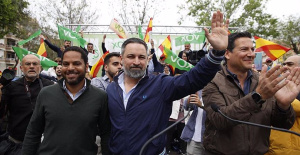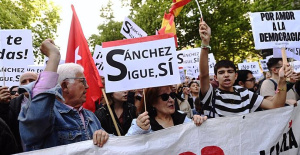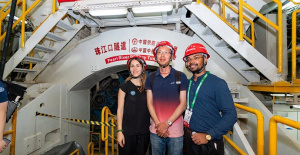He corrects himself and estimates the resources presented by the former president and former government ministers
MADRID, 15 Dic. (EUROPA PRESS) -
The Superior Court of Justice (TSJ) of Madrid has agreed with the ex-president of the Government Mariano Rajoy and the ex-ministers Cristóbal Montoro and Jorge Fernández Díaz and has agreed to paralyze the rogatory commission that Andorra issued regarding the complaint of the 'Operation Catalonia' presented against the three charges. Thus, he has corrected himself and has annulled the decision he adopted in October by which he had rejected the request of the former president and the former ministers.
In three orders, to which Europa Press has had access, the magistrates have estimated the resources of the former members of the Executive and have suspended the decision that the Ministry of Justice adopted in June, by which the rogatory commission issued the Principality.
Consequently, the court has also ordered that "the sending or return of the information received from the Investigating Court Number 32 of Madrid to the Andorran authorities be stopped."
The Justice of Andorra investigates Rajoy, Fernández Díaz and Montoro for alleged crimes of coercion, threats, blackmail, extortion, coercion of constitutional bodies and creation of a false document for their alleged relationship with attempts to find out "through illegal means" bank information secret of the former presidents of the Generalitat Jordi Pujol and Artur Mas, as well as the former vice president Oriol Junqueras.
Specifically, the facts denounced in the complaints are related to alleged extortion, coercion and blackmail since 2014 by agents of the National Police against those responsible for Banca Privada d'Andorra (BPA) to obtain bank information "through illegal means". secret protected by Andorran legislation" of various rulers of Catalonia and their relatives, including Pujol, Mas and Junqueras.
After months of various appeals, the former president and former ministers have managed to get the Madrid Supreme Court to agree with them and suspend Andorra's rogatory commission regarding the 'Operation Catalonia' complaint.
In contrast to what was agreed last November, on this occasion the court has indicated that "it is appropriate to agree on the requested precautionary measure" and that this "will be maintained until a final judgment is delivered that puts an end to the process or has ended for any other of the reasons provided In the law".
The magistrates have concluded that, "once the various interests in the conflict have been assessed", "circumstances" exist that justify the adoption of the measure requested by Rajoy, Montoro and Fernández Díaz.
The court has defended that the requested measure must be adopted because "the execution of the rogatory letter by the Ministry (of Justice) would entail damages that are difficult or impossible to repair for the interested party."
The TSJ has agreed to paralyze judicial assistance to the Principality because --despite what was believed at first-- the Ministry of Justice did not send the documentation required by Andorra.
This decision by the Madrid court takes place after last November the Provincial Court also corrected itself. That day, Rajoy agreed and the Investigating Court Number 32 was notified that he had to admit the appeal of the former president in which he requested the stoppage of the rogatory commission of Andorra.
The defenses of Rajoy, Fernández Díaz and Montoro had alleged that their rights had been violated because the court in question, when processing the aforementioned request, did not carry out the "prior control of legality in accordance with national and conventional legislation in matter of international cooperation.

 Exploring Cardano: Inner Workings and Advantages of this Cryptocurrency
Exploring Cardano: Inner Workings and Advantages of this Cryptocurrency Seville.- Economy.- Innova.- STSA inaugurates its new painting and sealing hangar in San Pablo, for 18 million
Seville.- Economy.- Innova.- STSA inaugurates its new painting and sealing hangar in San Pablo, for 18 million Innova.- More than 300 volunteers join the Andalucía Compromiso Digital network in one month to facilitate access to ICT
Innova.- More than 300 volunteers join the Andalucía Compromiso Digital network in one month to facilitate access to ICT Innova.-AMP.- Ayesa acquires 51% of Sadiel, which will create new technological engineering products and expand markets
Innova.-AMP.- Ayesa acquires 51% of Sadiel, which will create new technological engineering products and expand markets Abascal (Vox) criticizes that Sánchez is "victimizing" himself and calls for elections after his possible resignation
Abascal (Vox) criticizes that Sánchez is "victimizing" himself and calls for elections after his possible resignation Carlos Alcaraz reaches the round of 16 in Madrid without breaking a sweat
Carlos Alcaraz reaches the round of 16 in Madrid without breaking a sweat Some 5,000 people demonstrate in front of Congress for democracy, hours before Sánchez's decision
Some 5,000 people demonstrate in front of Congress for democracy, hours before Sánchez's decision STATEMENT: Intelligent systems used in the construction of the deepest underwater tunnel in China
STATEMENT: Intelligent systems used in the construction of the deepest underwater tunnel in China How Blockchain in being used to shape the future
How Blockchain in being used to shape the future Not just BTC and ETH: Here Are Some More Interesting Coins Worth Focusing on
Not just BTC and ETH: Here Are Some More Interesting Coins Worth Focusing on UPV students build a prototype of a wooden house to move to Equatorial Guinea
UPV students build a prototype of a wooden house to move to Equatorial Guinea The UA opens the call for the Impulso 2024 Awards for the best innovative business initiatives
The UA opens the call for the Impulso 2024 Awards for the best innovative business initiatives ALI, virtual assistant from Alicante, internationally recognized by the OECD
ALI, virtual assistant from Alicante, internationally recognized by the OECD Retrópolis brings the golden age of video games and computing to the UPV
Retrópolis brings the golden age of video games and computing to the UPV A million people demonstrate in France against Macron's pension reform
A million people demonstrate in France against Macron's pension reform Russia launches several missiles against "critical infrastructure" in the city of Zaporizhia
Russia launches several missiles against "critical infrastructure" in the city of Zaporizhia A "procession" remembers the dead of the Calabria shipwreck as bodies continue to wash up on the shore
A "procession" remembers the dead of the Calabria shipwreck as bodies continue to wash up on the shore Prison sentences handed down for three prominent Hong Kong pro-democracy activists
Prison sentences handed down for three prominent Hong Kong pro-democracy activists ETH continues to leave trading platforms, Ethereum balance on exchanges lowest in 3 years
ETH continues to leave trading platforms, Ethereum balance on exchanges lowest in 3 years Investors invest $450 million in Consensys, Ethereum incubator now valued at $7 billion
Investors invest $450 million in Consensys, Ethereum incubator now valued at $7 billion Alchemy Integrates Ethereum L2 Product Starknet to Enhance Web3 Scalability at a Price 100x Lower Than L1 Fees
Alchemy Integrates Ethereum L2 Product Starknet to Enhance Web3 Scalability at a Price 100x Lower Than L1 Fees Mining Report: Bitcoin's Electricity Consumption Declines by 25% in Q1 2022
Mining Report: Bitcoin's Electricity Consumption Declines by 25% in Q1 2022 Oil-to-Bitcoin Mining Firm Crusoe Energy Systems Raised $505 Million
Oil-to-Bitcoin Mining Firm Crusoe Energy Systems Raised $505 Million Microbt reveals the latest Bitcoin mining rigs -- Machines produce up to 126 TH/s with custom 5nm chip design
Microbt reveals the latest Bitcoin mining rigs -- Machines produce up to 126 TH/s with custom 5nm chip design Bitcoin's Mining Difficulty Hits a Lifetime High, With More Than 90% of BTC Supply Issued
Bitcoin's Mining Difficulty Hits a Lifetime High, With More Than 90% of BTC Supply Issued The Biggest Movers are Near, EOS, and RUNE during Friday's Selloff
The Biggest Movers are Near, EOS, and RUNE during Friday's Selloff Global Markets Spooked by a Hawkish Fed and Covid, Stocks and Crypto Gain After Musk Buys Twitter
Global Markets Spooked by a Hawkish Fed and Covid, Stocks and Crypto Gain After Musk Buys Twitter Bitso to offset carbon emissions from the Trading Platform's ERC20, ETH, and BTC Transactions
Bitso to offset carbon emissions from the Trading Platform's ERC20, ETH, and BTC Transactions Draftkings Announces 2022 College Hoops NFT Selection for March Madness
Draftkings Announces 2022 College Hoops NFT Selection for March Madness























